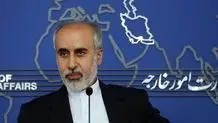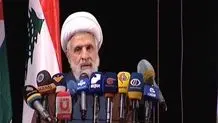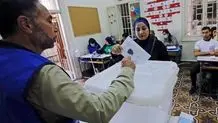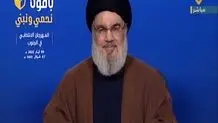Nasrallah:
Resistance relying on Iran as major regional power
Iran is the major regional power on which all the Resistance movements and the downtrodden people in the region rely, said Hezbollah Secretary-General Seyyed Hassan Nasrallah.
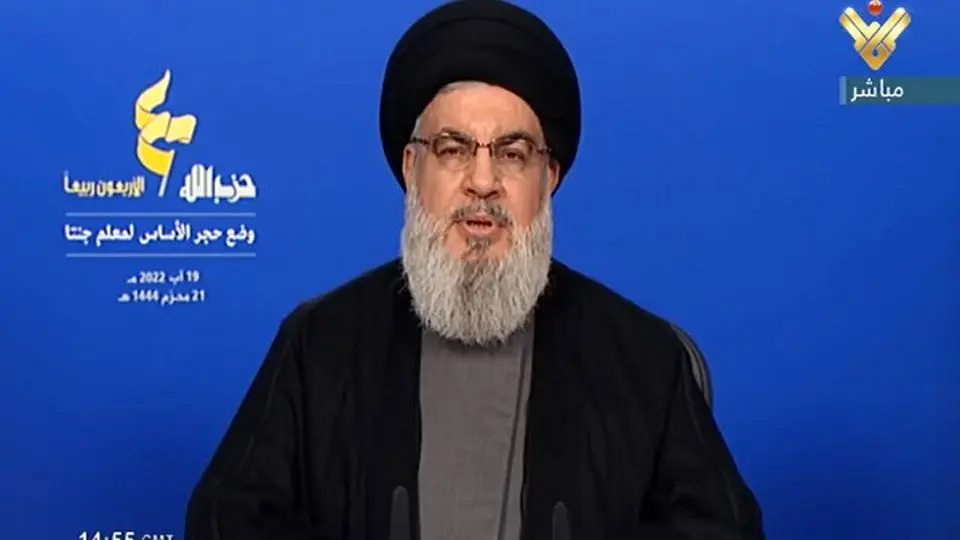
MEHR: Iran is the major regional power on which all the Resistance movements and the downtrodden people in the region rely, said Hezbollah Secretary-General Seyyed Hassan Nasrallah.
Seyyed Nasrallah's speech came during a festival organized by Hezbollah on the occasion of the 40th anniversary of its establishment.
The Resistance leader considered that one of the results of the legendary steadfastness in the July 2006 war was thwarting the so-called "New Middle East" project and ending the "Greater Israel" project, not to mention the Resistance's engagement in the file of restoring Lebanon's oil and gas rights, Al-Mayadeen reported.
Seyyed Nasrallah stressed that propaganda campaigns, distortion attempts, and lies can never destroy the will of this Resistance.
He also indicated that the Resistance is heading in the direction of developing its military structure and capabilities to keep pace with the developments at the level of weapons and technology.
Regarding the file of border demarcation with occupied Palestine, Seyyed Nasrallah stressed that the Zionist threats are to no avail, adding that Hezbollah's decision and approach are clear and "we are waiting for the coming days to act accordingly."
In his speech, the Secretary-General of Hezbollah underlined that the Palestinian cause is part of the religion, culture, and honor of this nation, stressing that there is no place for abandonment, neutrality, or retreat when it comes to this cause.
The core of Hezbollah's strategy toward the Palestinian cause is based on the ultimate conviction that the Palestinian people will continue to resist and reject nationalization and normalization, he indicated.
Hezbollah contributed to fighting ISIL in Iraq
Addressing Syria, which Hezbollah Secretary-General described as the backbone of the Axis of Resistance and the steadfastness front, characterized by ultimate refusal to Zionist conditions, he stressed, “By the day, we grow increasingly convinced of the validity of our choice and decision to go to Syria."
In this context, Seyyed Nasrallah stressed that "if Syria is exposed to any similar attacks, we will not hesitate to engage in the battlefields on its side.”
He said, "It is our duty to thank our fellow brothers in Syria who, throughout 40 years, stood by us, welcomed us with arms wide open, and provided us with political, diplomatic, and security protection, which we deeply thank Syria and its leadership for."
Seyyed Nasrallah added, "We will remain an integral part of the Axis of Resistance, which we trust will always be the solid basis for confronting hegemony projects and defending holy sites," pointing out that "Iran is the major regional power on which all the Resistance movements and the downtrodden people in the region rely."
He also revealed that Hezbollah contributed within its capabilities to fighting ISIL in Iraq and stressed that "if Iraq is exposed to this again and asks us, as in previous years, for help, we will not hesitate to send our leaders and fellow freedom fighters to go and fight side by side with our Iraqi brothers there."
On the relationship with Persian Gulf states, the Lebanese leader said, "We had no problem in developing Lebanon's relations, especially with the Persian Gulf, but some aim at turning Lebanon into an affiliate, which cannot be tolerated.”
Hezbollah to never be dragged into a civil war
Seyyed Nasrallah stressed that Hezbollah “will never be dragged and will not go into a civil war or engage in a sectarian strife,” recalling the Tayouneh ambush, in which a number of Lebanese citizens were martyred after snipers opened fire at unarmed peaceful protesters in Tayouneh, Beirut from the rooftops of buildings where they had stationed themselves.
Therefore, he called for addressing this issue, just as others, as it is linked to civil peace.
Hezbollah chief stressed that throughout the party's 40 years in Lebanon, "we avoided slipping into any civil war or sectarian strife, and this was what was being prepared for Lebanon in 2005, but we cooperated with the political forces to save Lebanon from going into war and falling prey to sectarian strife."
In this context, Seyyed Nasrallah considered that “internal security and stability are the responsibility of the state and should be governed by the cooperation of the various state components."
"Some are making every effort to drag the Resistance into a clash with the Lebanese army and security forces, and this is a permanent and declared American project," he stressed.
آخرین اخبار World را از طریق این لینک پیگیری کنید.

